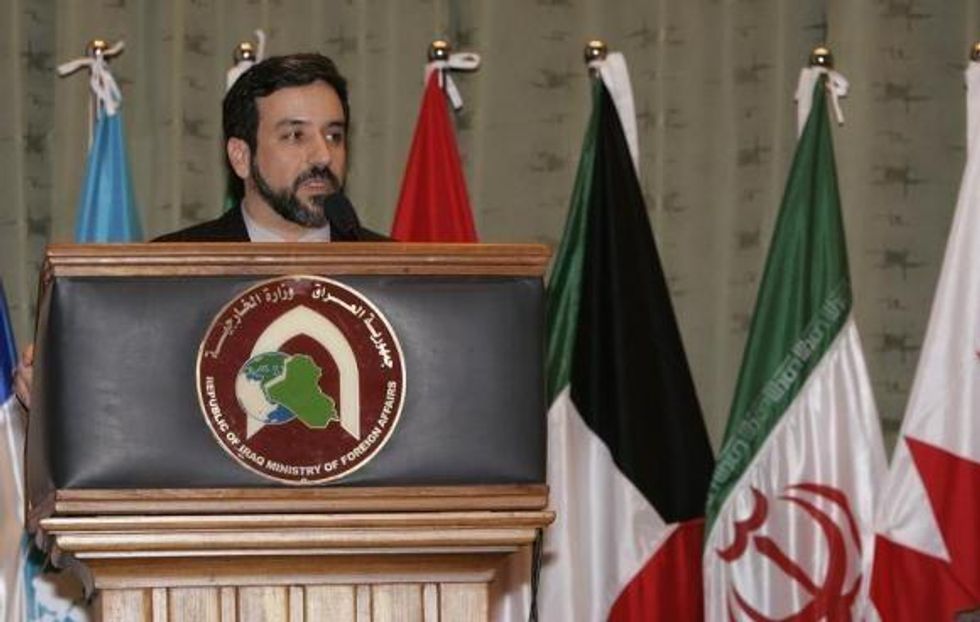

SUBSCRIBE TO OUR FREE NEWSLETTER
Daily news & progressive opinion—funded by the people, not the corporations—delivered straight to your inbox.
5
#000000
#FFFFFF
To donate by check, phone, or other method, see our More Ways to Give page.


Daily news & progressive opinion—funded by the people, not the corporations—delivered straight to your inbox.

"We are evaluating the situation and Iran will react accordingly to the new sanctions imposed on 19 companies and individuals," Araghchi, Iran's deputy foreign minister, told the Iranian Fars news agency on Friday.
The late November interim agreement between Iran and the P5+1 nations required Iran to freeze its nuclear program, despite no evidence of nuclear weapons development, in exchange for a slight--and critics charge grossly insufficient--easing of sanctions in a bid to buy time for more talks.
The deal unleashed a wave of hope in Iran that an easing of US-led sanctions would alleviate severe economic hardship and shortages of medical supplies and equipment that hit Iran's poor and working classes the hardest.
Yet, immediately following the agreement, the U.S. vowed to escalate enforcement of the sanctions that remained, the Christian Science Monitor reports.
Meanwhile, members of Congress are calling for more severe sanctions on Iran--a move that critics charge could jeopardize the deal and increase the risk of a regional war with dangerous and unknown consequences. The congressional move appears to be in step with vigorous efforts by both Israel and Saudi Arabia to prevent a deal with Iran.
Robert Naiman, policy director for Just Foreign Policy, told Common Dreams that the U.S. expansion of the black list is likely a bid on the part of the Obama administration to "stave off congressional action."
_____________________
Dear Common Dreams reader, The U.S. is on a fast track to authoritarianism like nothing I've ever seen. Meanwhile, corporate news outlets are utterly capitulating to Trump, twisting their coverage to avoid drawing his ire while lining up to stuff cash in his pockets. That's why I believe that Common Dreams is doing the best and most consequential reporting that we've ever done. Our small but mighty team is a progressive reporting powerhouse, covering the news every day that the corporate media never will. Our mission has always been simple: To inform. To inspire. And to ignite change for the common good. Now here's the key piece that I want all our readers to understand: None of this would be possible without your financial support. That's not just some fundraising cliche. It's the absolute and literal truth. We don't accept corporate advertising and never will. We don't have a paywall because we don't think people should be blocked from critical news based on their ability to pay. Everything we do is funded by the donations of readers like you. Will you donate now to help power the nonprofit, independent reporting of Common Dreams? Thank you for being a vital member of our community. Together, we can keep independent journalism alive when it’s needed most. - Craig Brown, Co-founder |

"We are evaluating the situation and Iran will react accordingly to the new sanctions imposed on 19 companies and individuals," Araghchi, Iran's deputy foreign minister, told the Iranian Fars news agency on Friday.
The late November interim agreement between Iran and the P5+1 nations required Iran to freeze its nuclear program, despite no evidence of nuclear weapons development, in exchange for a slight--and critics charge grossly insufficient--easing of sanctions in a bid to buy time for more talks.
The deal unleashed a wave of hope in Iran that an easing of US-led sanctions would alleviate severe economic hardship and shortages of medical supplies and equipment that hit Iran's poor and working classes the hardest.
Yet, immediately following the agreement, the U.S. vowed to escalate enforcement of the sanctions that remained, the Christian Science Monitor reports.
Meanwhile, members of Congress are calling for more severe sanctions on Iran--a move that critics charge could jeopardize the deal and increase the risk of a regional war with dangerous and unknown consequences. The congressional move appears to be in step with vigorous efforts by both Israel and Saudi Arabia to prevent a deal with Iran.
Robert Naiman, policy director for Just Foreign Policy, told Common Dreams that the U.S. expansion of the black list is likely a bid on the part of the Obama administration to "stave off congressional action."
_____________________

"We are evaluating the situation and Iran will react accordingly to the new sanctions imposed on 19 companies and individuals," Araghchi, Iran's deputy foreign minister, told the Iranian Fars news agency on Friday.
The late November interim agreement between Iran and the P5+1 nations required Iran to freeze its nuclear program, despite no evidence of nuclear weapons development, in exchange for a slight--and critics charge grossly insufficient--easing of sanctions in a bid to buy time for more talks.
The deal unleashed a wave of hope in Iran that an easing of US-led sanctions would alleviate severe economic hardship and shortages of medical supplies and equipment that hit Iran's poor and working classes the hardest.
Yet, immediately following the agreement, the U.S. vowed to escalate enforcement of the sanctions that remained, the Christian Science Monitor reports.
Meanwhile, members of Congress are calling for more severe sanctions on Iran--a move that critics charge could jeopardize the deal and increase the risk of a regional war with dangerous and unknown consequences. The congressional move appears to be in step with vigorous efforts by both Israel and Saudi Arabia to prevent a deal with Iran.
Robert Naiman, policy director for Just Foreign Policy, told Common Dreams that the U.S. expansion of the black list is likely a bid on the part of the Obama administration to "stave off congressional action."
_____________________